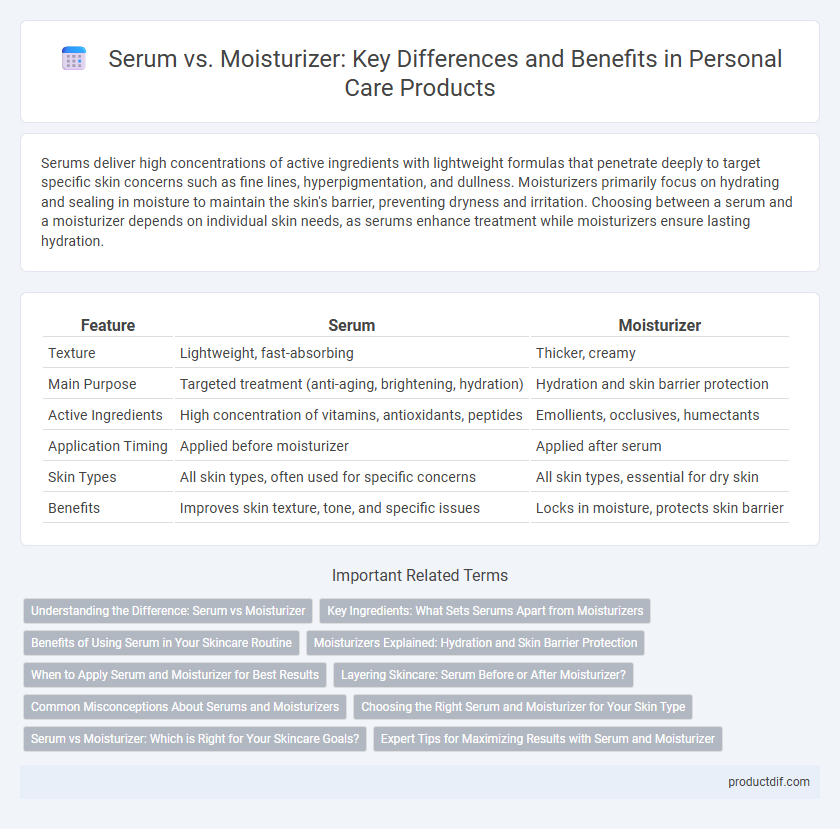Serums deliver high concentrations of active ingredients with lightweight formulas that penetrate deeply to target specific skin concerns such as fine lines, hyperpigmentation, and dullness. Moisturizers primarily focus on hydrating and sealing in moisture to maintain the skin's barrier, preventing dryness and irritation. Choosing between a serum and a moisturizer depends on individual skin needs, as serums enhance treatment while moisturizers ensure lasting hydration.
Table of Comparison
| Feature | Serum | Moisturizer |
|---|---|---|
| Texture | Lightweight, fast-absorbing | Thicker, creamy |
| Main Purpose | Targeted treatment (anti-aging, brightening, hydration) | Hydration and skin barrier protection |
| Active Ingredients | High concentration of vitamins, antioxidants, peptides | Emollients, occlusives, humectants |
| Application Timing | Applied before moisturizer | Applied after serum |
| Skin Types | All skin types, often used for specific concerns | All skin types, essential for dry skin |
| Benefits | Improves skin texture, tone, and specific issues | Locks in moisture, protects skin barrier |
Understanding the Difference: Serum vs Moisturizer
Serums are lightweight formulations with high concentrations of active ingredients designed to penetrate deeply into the skin, targeting specific concerns like wrinkles, hyperpigmentation, or hydration. Moisturizers create a protective barrier on the skin's surface to lock in moisture and prevent dryness, promoting overall skin hydration and smoothness. Understanding the difference between serum vs moisturizer helps optimize skincare routines by combining potent treatment (serum) with effective hydration and protection (moisturizer).
Key Ingredients: What Sets Serums Apart from Moisturizers
Serums typically contain higher concentrations of active ingredients like hyaluronic acid, vitamin C, and peptides, designed to penetrate deeper into the skin for targeted treatment. Moisturizers mainly focus on ingredients such as emollients, occlusives, and humectants like glycerin and ceramides, which create a protective barrier to lock in moisture and maintain hydration. The key distinction lies in serums delivering potent, lightweight nutrients to address specific skin concerns, whereas moisturizers emphasize hydration and barrier reinforcement.
Benefits of Using Serum in Your Skincare Routine
Serums deliver high concentrations of active ingredients like hyaluronic acid, vitamin C, and retinol directly to the skin, enhancing hydration, brightening, and anti-aging effects. Their lightweight formulas penetrate deeper than moisturizers, targeting specific concerns such as fine lines, pigmentation, and dullness more effectively. Incorporating serum into your skincare routine boosts overall skin health by improving texture, elasticity, and radiance while complementing the moisturizing step.
Moisturizers Explained: Hydration and Skin Barrier Protection
Moisturizers primarily provide hydration by locking in moisture and strengthening the skin's barrier to prevent water loss and environmental damage. Formulated with emollients, occlusives, and humectants, moisturizers support skin elasticity and repair while maintaining optimal hydration levels. Effective moisturizers enhance skin texture, reduce dryness, and protect against irritants, making them essential for daily skincare routines.
When to Apply Serum and Moisturizer for Best Results
Apply serum immediately after cleansing and toning to allow its concentrated ingredients to penetrate deeply into the skin. Follow with a moisturizer to lock in hydration and create a protective barrier that enhances the serum's effectiveness. For optimal results, use serum and moisturizer twice daily, morning and night, to maintain balanced and nourished skin.
Layering Skincare: Serum Before or After Moisturizer?
Apply serum before moisturizer to maximize absorption and effectiveness, as serums contain smaller molecules designed to penetrate deeply into the skin. Moisturizers create a protective barrier that locks in the serum's active ingredients and provides hydration. Layering skincare products in this order enhances skin nourishment and improves overall texture and radiance.
Common Misconceptions About Serums and Moisturizers
Serums and moisturizers serve distinct purposes in skincare, with serums delivering concentrated active ingredients like hyaluronic acid or vitamin C for targeted treatment, while moisturizers primarily focus on hydrating and sealing the skin barrier using emollients and occlusives. A common misconception is that serums replace moisturizers; however, serums should be applied before moisturizers to maximize absorption and efficacy. Many users also mistakenly believe that thicker textures automatically mean better hydration, but lightweight serums can penetrate deeper layers of skin to provide enhanced benefits beyond surface-level moisture.
Choosing the Right Serum and Moisturizer for Your Skin Type
Selecting the right serum and moisturizer depends on your skin type and specific concerns; for oily skin, lightweight, non-comedogenic formulas with ingredients like hyaluronic acid and niacinamide are ideal. Dry skin benefits from hydrating serums containing hyaluronic acid and moisturizers with ceramides or glycerin to lock in moisture. Sensitive skin requires fragrance-free, calming formulations with antioxidants and soothing agents such as aloe vera or chamomile to reduce irritation and enhance skin barrier function.
Serum vs Moisturizer: Which is Right for Your Skincare Goals?
Serums, concentrated with active ingredients like hyaluronic acid and vitamin C, target specific skin concerns such as fine lines, dullness, and hyperpigmentation, offering potent, fast-absorbing benefits. Moisturizers primarily hydrate and protect the skin barrier with emollients and occlusives, essential for maintaining moisture balance and preventing dryness. Choosing between serum and moisturizer depends on your skincare goals: opt for serums to address targeted issues and use moisturizers to maintain overall skin health and hydration.
Expert Tips for Maximizing Results with Serum and Moisturizer
Experts recommend applying serum before moisturizer to ensure deep skin penetration and enhanced hydration. Use a few drops of serum with active ingredients like vitamin C or hyaluronic acid, followed by a moisturizer suited to your skin type to lock in moisture and amplify benefits. Consistent layering and gentle patting optimize absorption and maximize overall skincare results.
Serum vs Moisturizer Infographic

 productdif.com
productdif.com